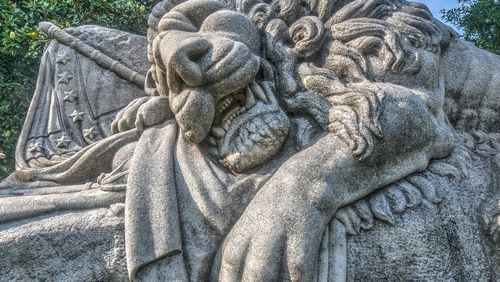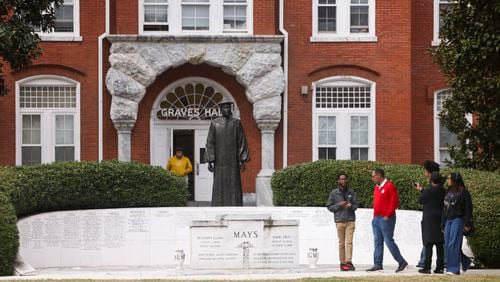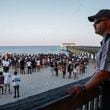Across the South, cities, counties and states have been grappling with how to address Confederate iconography on government-owned property.
Atlanta is among those municipalities. In the coming weeks, there may be a resolution.
Atlanta Mayor Kasim Reed is expected to decide by Dec. 13 on whether to rename several streets in the city named for Confederate generals or leaders. Earlier this year, Reed and the City Council appointed an 11-member committee to explore how the city might deal with the statues, avenues and monuments that memorialize the Confederacy. The committee gave its report to Reed and the council last month. Here's what you need to know before the mayor announces his decision.
1. Where statues and monuments have been the focus of tumultuous dissent in cities such as New Orleans, in Atlanta it's streets that are a greater issue. The committee identified just six monuments and statues around the city, including the Confederate Obelisk and Lion of the Confederacy, both in Oakland Cemetery. But there are at least 33 streets in the city associated with the Confederacy. Among the ones the committee suggested should be immediately renamed are Confederate Avenue, East Confederate Avenue, and streets named after Confederate military leaders Nathan Bedford Forrest, John B. Gordon, Robert E. Lee, Stephen Dill Lee and Howell Cobb. The committee's reason: The men got involved in white supremacist activities after the Civil War. Forrest became one of the first leaders of the Ku Klux Klan.
2. There is precedent for the name changes. Other streets in Atlanta that now carry the names of civil rights leaders and anti-segregationists were once named for Confederates. Gordon Street became Ralph David Abernathy Boulevard, Forrest Avenue became Ralph McGill Boulevard and Ashby Street was renamed Joseph E. Lowery Boulevard. Other thoroughfares with similar name changes include Bedford Place, which was renamed Central Park Place/Argonne Avenue, Rolling Mill Street became Boulevard, Calhoun Street was renamed Courtland Street and Jackson Street became Parkway Drive.
3. State law makes it illegal to remove, conceal, obstruct or alter publicly owned Confederate monuments. Street names don't fall under this law, which would make is easier for the city to immediately change them.
4. But the committee suggested two monuments be removed and put into city storage: the "Peace" statue in Piedmont Park and the "Reconciliation" marker at Peachtree Street and Peachtree Battle. Given the state law, that could prove difficult. The law does allow, however, for "interpretations" to be added to monuments. The committee suggested any remaining Confederate monuments should at least have additional markers installed that explain slavery as the cause of the war. Markers should also include language explaining how African-Americans were systematically disenfranchised from full citizenship in the decades after Reconstruction.
5. If Reed does not act before his term ends in January, it will be left to the new mayor to decide whether to rename the streets. The Atlanta Journal-Constitution emailed the mayoral campaigns of both Keisha Lance-Bottoms and Mary Norwood asking if each would implement the committee's recommendations. As of Saturday, neither campaign had responded.
About the Author







